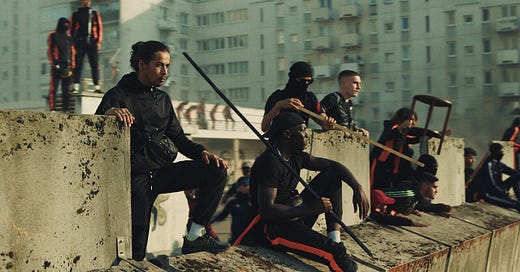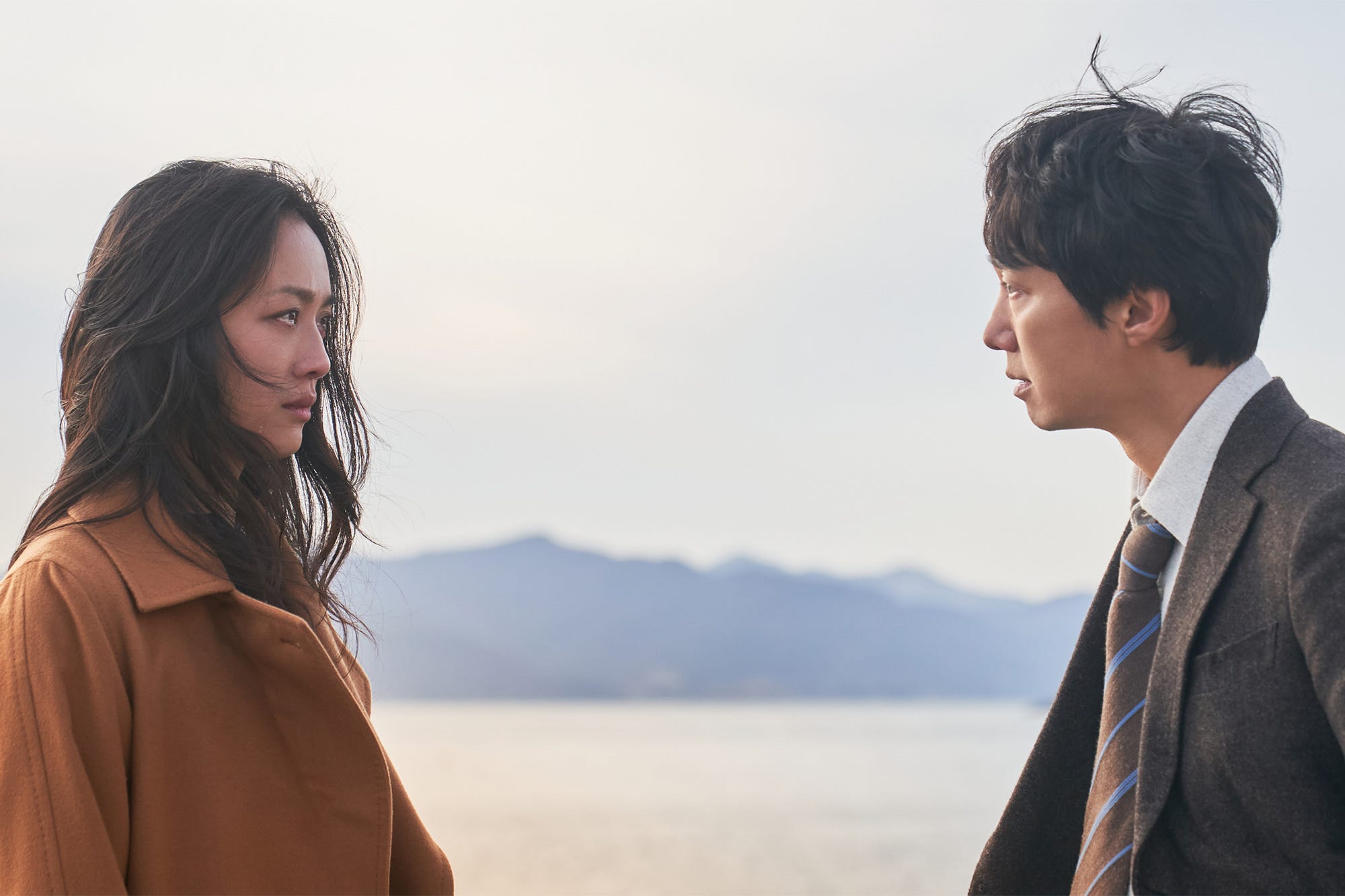Hoooooooly cow it’s been a minute! What’s up everybody?
For various reasons we took an extended summer break, and depending on your neck of the woods it might still feel like summer anyway so who’s to say? But as the crisp fall comes into the air (or your local equivalent), we come back online, ready to talk movies with the best of ‘em.
Today we’ve got two recent foreign film releases that are simply put, stunners. First up, Cate on the pure thrill of Netflix’s Athena. Then Zosha dives into the romanticism of Decision to Leave. Happy to be back at it here with you, and ready to do some good ol’ fashioned movie yelling. Enjoy!
Cate on Athena
These days, it’s rare that a film leaves me in genuine awe. When you watch movies for a living, you become accustomed to the familiar beats and rhythm of the form. You know what’s coming next because the structure of filmmaking lends itself to only so many conclusions — tropes become format become cliché. But Netflix’s Athena, the new film from Romain Gavras, finds ways to innovate the filmic form so dramatically, that it reminded me why I fell in love with movies to begin with.
Set largely in a French housing estate populated by Algerian Muslims, Athena follows the plight of three brothers as they deal with the death of their youngest sibling at the hands of French police. Mired in chaos and violence, each brother takes a singular approach to their tragedy and grief, culminating in a community uprising they all must contend with.
It is hard to overstate how absolutely stunning this film is. Largely composed of minutes-long tracking shots through space, the film is tense, propulsive and emotional. As the brothers find themselves on opposing sides of a brewing civil conflict, they’re forced to confront their own values and make difficult decisions that put them at odds with each other.
The film’s central conflict is the death of Idir, the youngest brother of Karim (Sami Slimane) — an outraged community leader, Moktar (Ouassini Embarek) — a self-interested drug dealer, and Abdel (Dali Benssalah) — a justice-minded soldier in the French army. Idir was murdered in the streets of France in broad daylight by men dressed in police uniforms. His body was left on display, and footage of the killing went viral across the country.
It is Karim who initiates the film’s energetic climax — and the film is nearly all climax. Frustrated by the lack of action in his brother’s case, he leads a group of like-minded young men in a siege against the police, promising retaliation unless the perpetrators of his brother’s murder are punished. The unrest they generate spreads through the city, as others join in on the long-simmering tensions between the French state and the country’s ethnic minorities.
Gavras is clear about the racism underlying the conflicts in the film, making them legible through news anchor talking heads who parrot near-genocidal language about a community of people who simply want to live in peace. As we’ve seen replicated across the world in a variety of conflicts, when the oppressed fight back, their justified violence is used as justification for their oppression.
But at the heart of this civil conflict is a familial one. Karim and Abdel in particular are at opposite ends of the dispute. Karim feels justified in turning the Athena complex into a war zone as a signal of the seriousness of their demands. But Abdel still believes in the rule of law, and the power of the state to right its own wrongs. Until he doesn’t.
The film’s explosive finale and devastating coda firmly place the story in the realm of pragmatic pessimism. When all is said and done, the community resistance against an oppressive state is not respected, but quelled. The cycle resets so that it may begin again. But it’s a stark reminder of the stakes of these lived conflicts. Eventually, someone will have nothing left to lose.
Despite its melancholy, Athena is a true feat of filmmaking. It is awesome in the true sense of the word. The world it builds is meticulously created, staged and explored with blink-and-you’ll-miss-it energy. Gavras holds tension in every frame and every close-up. Slimane gives a tour-de-force performance in his first-ever role, anchoring the rage and frustration of this community in very real grief.
But it is the cinematography that makes this film sing. This tiny building and its attendant courtyard feel expansive, and claustrophobic all at once. Every inch of it explored in real time as day turns to night, and night turns to tragedy. It is an unforgettable film that achieves what so few do — it makes you feel.
Zosha on Decision to Leave
There is a gulf of words in Decision to Leave. The movie is defined by that very presence of an absence: What does it mean to know someone, or to not know them at all? What could you be missing in either category?
Decision to Leave, the newest film from Park Chan-wook, revels in such messy equivocation. As Detective Hae-jun (Park Hae-il) investigates the death of Seo-rae’s (Tang Wei) husband, he finds himself inexplicably pulled to her. Or, more accurately to Park’s style, he finds himself wanting to be in her world: On Hae-jun’s nocturnal stakeouts he imagines himself in her life, listening in the room as she records a voice memo or goes about her day.
That sounds creepy, and Decision to Leave doesn’t really waste its time trying to talk you out of that. But the film manages to strike a more surprising tone (though not to those who are familiar with Park’s back catalog), soaking the film in a lush, vivid romanticism that makes the attraction plainly mutual, and helps make the sharp cinematography feel all the more stunning. The two orbit around each other not as planetary bodies but as coins swirling around a spiral wishing well, looping closer and closer until they’re pulled into a dizzying final twist.
The idea of a detective falling in love with their prime suspect isn’t new ground, but Park moves the film along at a steady clip to absorb every detail of their interactions. This is a romance of observation and being known. And what comes through most in the film is the almost delirious high that comes from seeking out the attention of another. It’s like a good buzz, equal parts disorienting and delightful, and leaving your insides squirming. Boundaries pop up just as quickly as they disappear for Seo-rae and Hae-jun, whose magnetic pull to each other feels almost too good to be true. And in many ways, it is: He’s married, she’s the subject of an investigation. It’s straight drama, packed to the gills with tiny aspects that they pull from or notice about each other. But here it’s balanced against Park’s penchant for tender humor, finding the grounded humanity even beneath the heightened tone of it all.
By the end, the movie takes their romance on a turn for the more mythic, almost more closely resembling the (traditional) stories of mermaids returning to sea foam than a rom-com (though I’d argue it is that, at least for me). It’s here that Decision to Leave left me a little cold, like it was missing a bit of heat in its seasoning, or another chapter to bring me home. Perhaps some of that is selfishness, a desire to live in a beautiful world and see these characters wrestle with the vulnerabilities of being seen — and wanting that more than anything — for just a while longer. But it’s also a choice from Park, who directed and co-wrote the movie with Jeong Seo-kyeong, a bold image that pools in your head like a crush. I could make a case for this ending in a million different ways, and perhaps some of the tone of this “review” is muddy because I’m not sure what I want to do. But if you want a more purely qualitative critical opinion it’s this: I can’t wait to see it again tonight, and I’ll let you know.
Assorted Internet Detritus
CATE: After you’ve seen Athena make some time to watch this absolutely incredible behind-the-scenes featurette about how Gavras achieved those incredible shots. Then hobble over this wonderful profile of the one and only Whoopi Goldberg, a heart-wrenching conversation about saying goodbye and the end of life, and a little more worrying about the black martyr trope of Don’t Worry Darling.
ZOSHA: House of the Dragon is actively working away from Game of Thrones now, and also doing interesting shit with foot fetishes. The huge perk of being a beauty reporter that isn’t a perk at all. Biding our time with Beyonce’s expansive listening journey. Watch Eyes of Fire!!! I also wrote a thing on Mike Flanagan’s whole thing which I joyfully watched everything he’s ever done (almost) for.
If you’re just finding this newsletter, do us a favour and subscribe. It feeds our fragile egos. You can even drop us a line in the comments below. And if you’re already a loyal reader, help us out and tell a friend. Happy movie yelling!
Zosha + Cate <3
twitter:@30FlirtyFilm
instagram:@30FlirtyFilm









